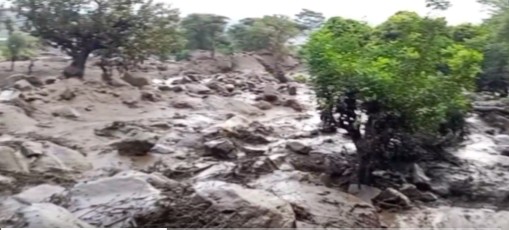Search and rescue operations continue in Elgeyo Marakwet following devastating mudslides that have affected over 800 families and claimed at least 26 lives. The Kenya Defence Forces (KDF) and police have deployed sniffer dogs to assist in locating bodies and potential survivors in the most inaccessible areas of Kerio Valley.
A KDF helicopter airlifted three sniffer dogs to the affected areas amid fears that survivors could be trapped under the mud. The dogs are expected to play a crucial role in detecting any bodies or individuals stuck in the mudslides.
Interior Cabinet Secretary Kipchumba Murkomen has directed the National Youth Service (NYS) personnel to support the ongoing operations, including assisting displaced families. Elgeyo Marakwet Governor Wisley Rotich said the search and rescue efforts are now on the third day and that opening blocked roads is a priority to improve access to the affected villages.
“The impact of the mudslides was severe, and it will take time before the operation is complete,” Rotich noted. The government has taken full responsibility for the costs of rescue operations, including medical treatment, burials, and resettlement of the displaced. President William Ruto has instructed the multi-agency team to continue operations until all missing persons are accounted for.
An aerial survey reveals massive destruction across more than ten villages, including Kamogo, Mkeno, Moror, Murkutwo, Chesongoch, Chechan, Kabetwo, Mogil, and Kepkener. Many residents described the tragedy as unprecedented, with some losing homes, livestock, and property.
Humanitarian aid is now critical, as hundreds of Kenya Red Cross workers have joined the rescue mission. Dr. Phillip Cheptinga, coordinating medical care, reported that most injured survivors are in stable condition at Moi Teaching and Referral Hospital (MTRH).
Local leaders and residents have expressed gratitude to the government and relief teams for their support, while acknowledging the long road to recovery ahead. The tragedy has left a deep mark on the community, emphasizing the need for continued humanitarian support.

